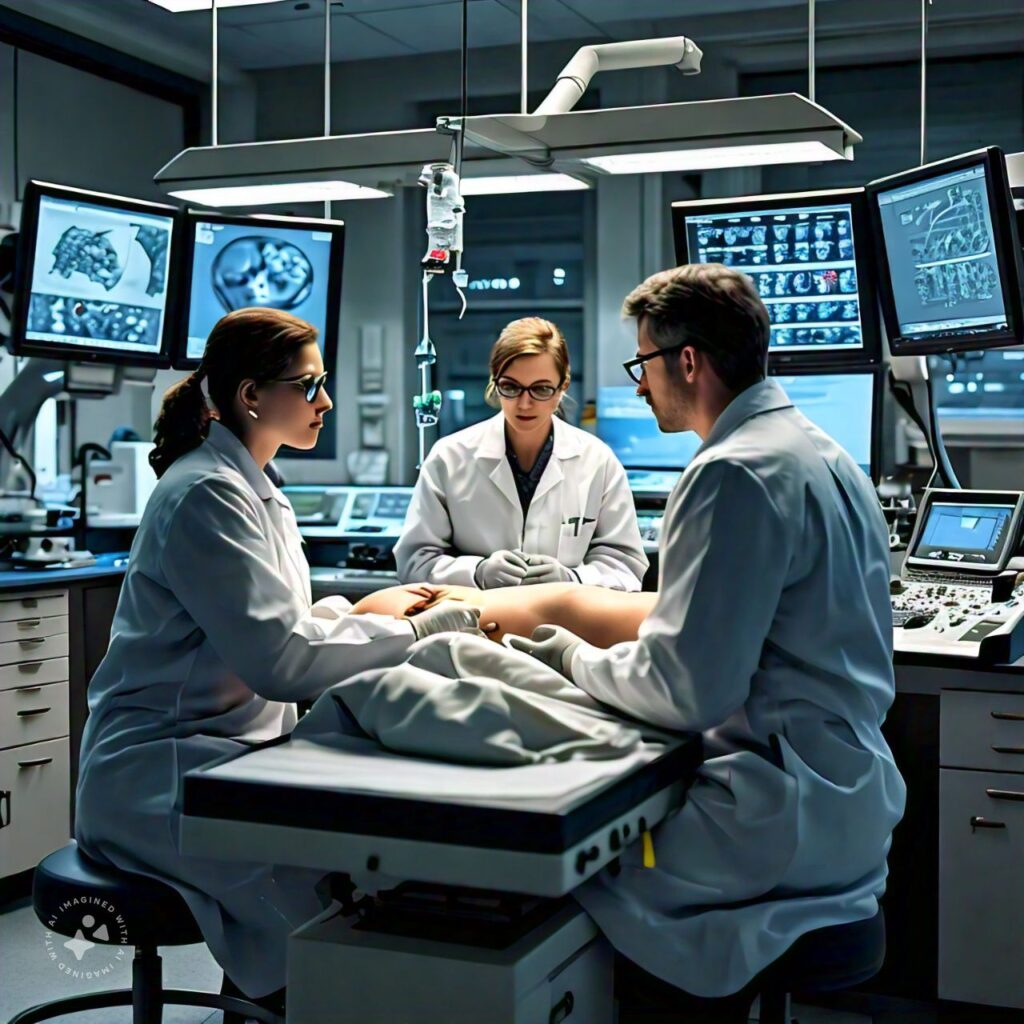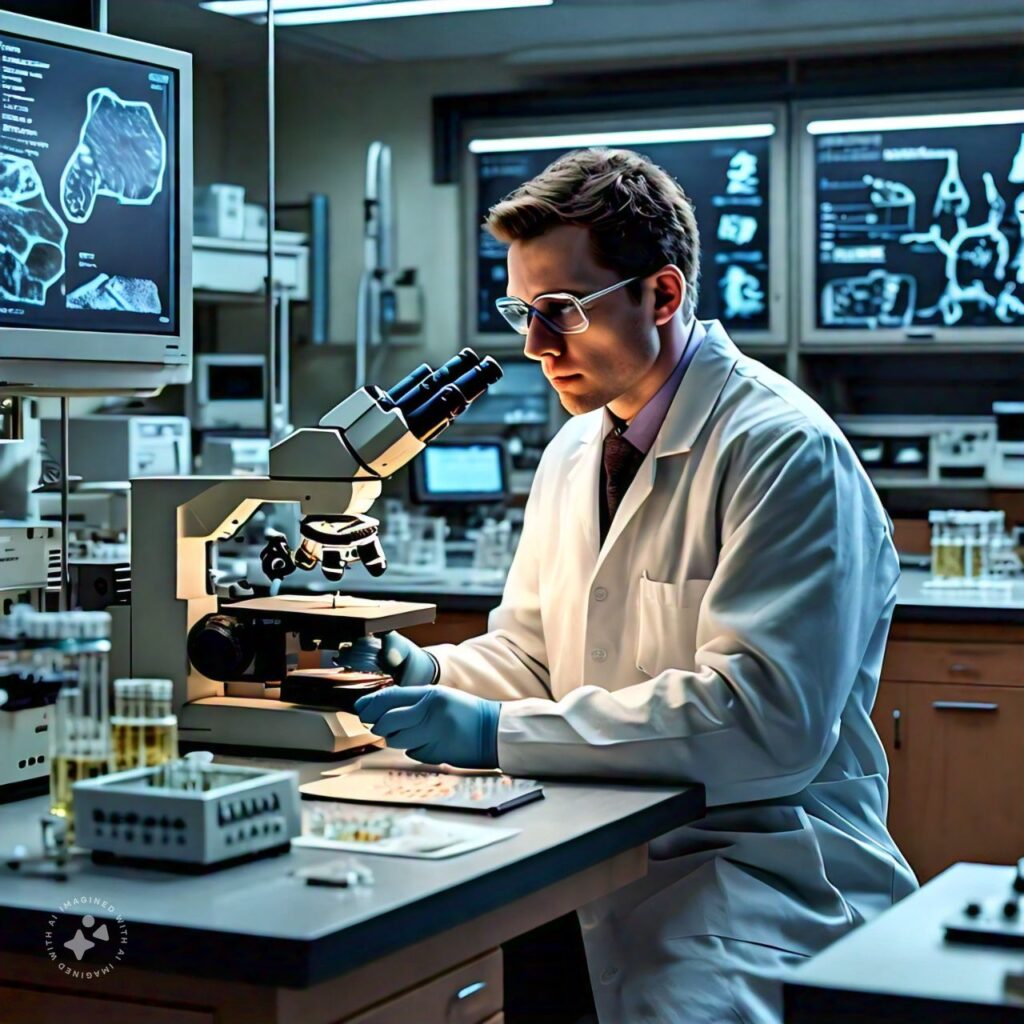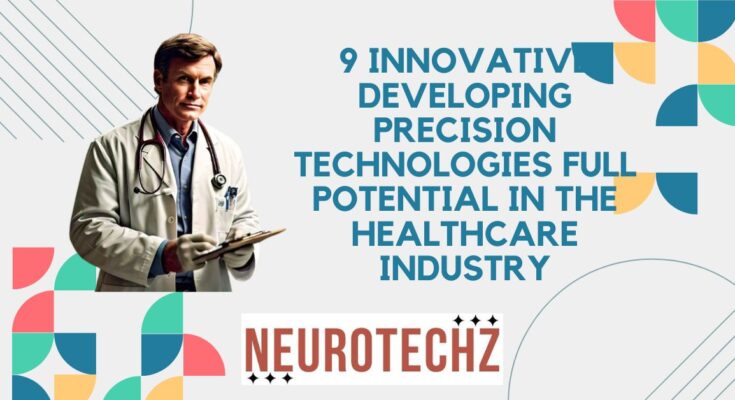Healthcare precision technologies use artificial intelligence tools like artificial intelligence, data analytics, and genetics to increase diagnosis and treatment accuracy, efficacy, and personalisation. These advancements make healthcare more accurate and proactive, enabling early disease identification, highly customized patient care, and better outcomes. By combining AI, big data, and genomics, precision technologies in healthcare deliver personalized treatments, early and accurate diagnosis, and better patient outcomes. They improve the effectiveness of the healthcare system and make it more proactive, efficient, and patient-centred by promoting preventive care, advancing medical research, and lowering healthcare inequities.
Using AI, data analytics, and genomics as examples, the essay “Unlocking the Power of Precision Technologies in Healthcare” seeks to inform readers about how these and other precision technologies are transforming healthcare. It tackles associated obstacles, gives real-world examples, draws attention to their advantages, such as better diagnoses and customized treatments—and encourages stakeholders to invest and innovate. The paper concludes with a picture of when these innovations will improve patient outcomes and healthcare delivery.
The Evolution of Precision Technologies in Healthcare
Advances in data-driven methods have replaced generic, one-size-fits-all approaches in advancing precision technologies in healthcare. The 1990s digital revolution brought electronic health records and early data analytics, while early healthcare depended on standardized treatments. AI and machine learning improved diagnostic precision and tailored treatments in the 2010s, while the Human Genome Project made personalized medicine possible in the 2000s. Recent advances include surgical robotics, wearable technology that provides real-time health data, and high-resolution imaging. Healthcare is becoming more accurate, individualized, and efficient because of new technologies like CRISPR and liquid biopsies.
Applications in Diagnosis
Accurate, quick, and personalized diagnoses are now possible because of precision technologies, which have completely changed the diagnostic processes in healthcare. Following is a thorough examination of their main uses:
Advanced Imaging Techniques
Internal body structures can be precisely and in-depth visualized using advanced imaging Precision Technologies, such as high-resolution MRI, CT, and PET scans. With the ability to see anomalies, tumours, and other medical disorders more clearly, these imaging techniques improve diagnostic accuracy. One tool that helps identify neurological illnesses is functional magnetic resonance imaging, or fMRI, which measures variations in brain activity. Due to its ability to detect minute or subtle changes that traditional approaches might overlook, advanced imaging plays a crucial role in the early diagnosis of diseases like cancer.
Artificial Intelligence (AI) and Machine Learning (ML)
The analysis of vast amounts of medical data, such as genetic data, patient records, and medical imaging, has allowed AI and ML systems to revolutionize diagnostic processes. High-accuracy patterns and anomaly detection are possible with AI-powered diagnostic tools. Artificial Intelligence (AI) technologies are utilized in radiology image analysis to detect anomalies more rapidly and precisely than human radiologists. These systems are used to look for symptoms of diseases such as lung infections, cancer, and cardiovascular disorders. Using patient data analysis and genetic and historical data, ML models also help with predictive diagnostics by predicting the chance of developing particular disorders.
Genomic and Molecular Diagnostics
Finding genetic mutations or changes that could point to the existence of a disease is the goal of genomic and molecular diagnostics, which examine a patient’s genetic makeup. Genetic illnesses or genetic predispositions to diseases like cancer can be identified by genome-wide research made possible by next-generation sequencing (NGS) techniques. One non-invasive technique for detecting and tracking the advancement of cancer is liquid biopsies, which find cancer biomarkers in blood samples.

Integrative Diagnostics
A patient’s entire health is provided via integrative diagnostic approaches, which integrate data from several sources, including imaging, genetic data, and patient history. This integrated approach enables more precise and comprehensive diagnoses by connecting several data types and spotting intricate patterns that might not be visible from a single data source. For instance, genetic information can be combined with imaging findings to improve the detection of genetically based disorders, like some forms of cancer.
Precision Diagnostics in Rare and Complex Diseases
Precision technologies are beneficial when identifying uncommon and complicated illnesses that might not meet conventional diagnostic standards. Advanced genomic sequencing and AI algorithms can provide precise diagnoses and individualized treatment plans by identifying uncommon genetic mutations or patterns linked to uncommon illnesses. This capability is essential for diseases that are challenging to diagnose using traditional techniques and may call for specialized knowledge.
Precision in Treatment
Treatment precision increases effectiveness and minimizes adverse effects by customizing medical therapies to each patient’s genetic, molecular, and physiological features. Using personalized medicine, which creates treatment plans based on genetic profiles and lifestyle factors, differs from conventional one-size-fits-all approaches. Drug selection and dose are optimized by pharmacogenomics, whereas targeted therapies concentrate on particular disease pathways. Genome-based drug development expedites the discovery of targeted therapeutics, and adaptive techniques modify treatments in real-time based on patient response. Treatment is further improved, and side effects are reduced by integrating AI and artificial intelligence technology.
Enhancing Patient Care
Precision technology can improve patient care using artificial intelligence instruments to provide more individualized, successful, and efficient healthcare. Customized treatment regimens based on lifestyle and genetic data are developed, wearables are used to provide real-time monitoring, and genomic testing and artificial intelligence are used to improve diagnosis accuracy. Digital systems that facilitate patient access to health information also promote efficiency. Automation and advanced imaging boost efficiency. Precision technologies make targeted treatments and ongoing innovation possible, which also help complex cases and eventually enhance patient outcomes and satisfaction.
Improving Efficiency and Reducing Costs
Using artificial intelligence instruments and techniques to optimize resource usage, simplify healthcare processes, and cut costs overall are all part of advancing efficiency and cutting costs through precise technologies. An in-depth analysis of precise technologies’ contributions to these objectives is provided here:
Automation of Routine Tasks
Precision technology, such as AI and machine learning, automates regular administrative operations like scheduling, billing, and data input. This decreases human error, speeds up administrative procedures, and relieves healthcare workers of burden. AI-driven scheduling solutions, for instance, can improve appointment scheduling, resource utilization, and no-show rates.
Optimized Resource Allocation
Advanced data analytics allows healthcare providers to allocate resources more efficiently. By evaluating patient data, healthcare institutions can plan for service demand, control personnel levels, and maximize medical equipment. Predictive analytics, for example, can forecast peak times for emergency departments to improve staffing and resource management.
Enhanced Diagnostic and Treatment Accuracy
As a result, fewer pointless tests and treatments are required. Precision technologies also increase treatment planning and diagnostic accuracy. AI-driven diagnostic tools and artificial intelligence imaging technology produce more precise results, which can help prevent unnecessary surgeries and other problems. This results in less money spent on follow-up care and mistakes and a more effective use of medical resources.

Reduced Hospital Readmissions
Healthcare practitioners can achieve improved chronic condition management and lower hospital readmission rates by leveraging predictive analytics and real-time monitoring. To notify medical professionals of any problems before they become urgent, remote monitoring devices, for example, can follow patients’ vital signs. Reducing the need for expensive hospital readmissions and improving condition management are two benefits of this proactive strategy.
Case Studies
Case studies show how precise the healthcare industry Precision Technologies are used in the real world and how significantly they may change things. Consider the improved results for cancer patients over traditional treatments made possible by tailored medications and genomic profiling in precision oncology. Likewise, real-time insulin dosage modifications have improved glycaemic control and patient quality of life in diabetes care due to continuous glucose monitoring. Enhancing early cancer detection with AI-powered diagnostic imaging and optimizing cardiovascular disease treatment through pharmacogenomic testing are two examples of how tailored techniques might be beneficial.
Telemedicine and robotically assisted procedures have improved chronic illness care, shortened recuperation times, and increased precision. Whole-exome sequencing has made the diagnosis of rare genetic illnesses possible, and AI-enhanced MRI analysis has made it possible to diagnose Alzheimer’s disease sooner. These case examples illustrate the considerable role that precision technologies play in contemporary medicine by highlighting how they improve patient outcomes, provide more individualized care, and increase healthcare delivery efficiency.
Challenges and Considerations
Data integration and privacy are two significant obstacles to using precision technologies in healthcare. Strict adherence to laws like GDPR and HIPAA is necessary to protect sensitive patient data. Integrating new technologies with current systems can sometimes take time, and maintaining interoperability and efficiency requires considerable planning and investment.
Furthermore, significant obstacles are to overcome, especially for smaller or underfunded facilities: high starting expenses, continuing maintenance, and the need for technical competence. Ethics-related concerns like AI decision-making and genetic privacy need to be considered. Technology adoption is made more complex by the need for complete strategies and support to ensure data quality, get patient acceptability, navigate regulatory landscapes, and scale innovations across varied settings.
The Future of Precision Technologies in Healthcare
Driving breakthroughs in digital health, AI, and genomics, precision technologies in healthcare are set to undergo revolutionary developments in the future. New therapeutics will be made possible by precisely targeting genetic mutations using improved genomic tools, such as improved CRISPR procedures. AI and machine learning will provide deeper insights from complex data analysis, enhancing proactive care and individualized therapy. Whereas telemedicine will increase access to all-encompassing remote care, IoT and digital health integration will enable real-time monitoring. Progress in vaccinations and preventive medicines will boost efficacy, and future drug research will centre on customized regimens. However, developing ethical and legal frameworks will be essential to address equity, data security, and privacy concerns.
Summary
Finally, precision technologies are revolutionizing the healthcare industry by increasing diagnostic precision, customizing care, and boosting patient outcomes. More personalized treatment is provided thanks to artificial intelligence technologies, including real-time monitoring, AI diagnoses, and genetic sequencing. With improved medication discovery, personalized medicine, and increased access through digital solutions, these technologies hold great promise for further revolutionizing healthcare. It is still imperative to solve issues like integration and data privacy. To fully use these technologies and ultimately move towards a healthcare system that is more responsive, egalitarian, and efficient, stakeholders are urged to work together, make research investments, and overcome ethical dilemmas.




